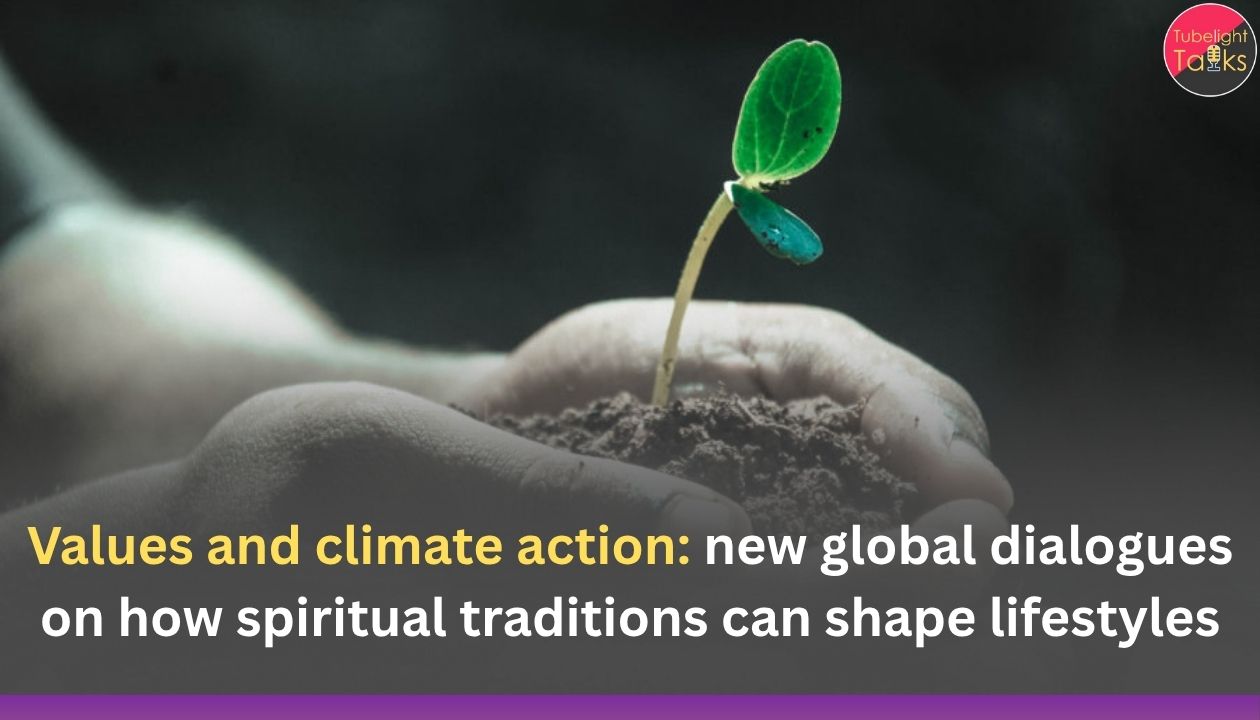Values and climate action: new global dialogues on how spiritual traditions can shape lifestyles
Values and climate action: For years, climate negotiations were dominated by numbers: tonnes of CO₂, degrees of warming, billions of dollars in finance. Increasingly, another language is entering the room—the language of values, ethics and spirituality.
From the UN Environment Programme’s Faith for Earth initiative to Pope Francis’s Laudato Si’ and interfaith declarations at climate summits, religious and spiritual traditions are being invited to talk about something technocratic models struggle with: why we consume the way we do, and how we can change our lifestyles fairly.
These new dialogues do not replace science or policy. Instead, they ask whether ideas like stewardship, compassion, simplicity and justice can help societies move away from high-carbon consumption and towards climate justice—especially for those who contributed least to the crisis.
What are these “values and climate action” dialogues?
From emissions targets to moral questions
- The UN Environment Programme’s Faith for Earth initiative works with faith-based organisations to link spiritual teachings on stewardship and care for creation with practical climate action and the Sustainable Development Goals.
- Academic and policy studies now refer to interfaith climate action—networks of religious groups engaging with climate negotiations and justice questions, not just charity projects.
These dialogues typically revolve around three questions:
- How should people of faith live, travel, eat and consume in a warming world?
- How do concepts like dharma, stewardship, compassion or justice shape what is “enough”?
- How can spiritual authority be used responsibly to push for climate justice, not only personal guilt?
Lifestyle and consumption: concrete faith-based pledges
Catholic world:
Laudato Si’
and “ecological conversion”
Pope Francis’s 2015 encyclical Laudato Si’ argued that environmental degradation and social injustice are two sides of the same crisis, calling for changes in “lifestyle, production and consumption” as a moral duty. The document has inspired:
- Catholic dioceses and religious orders to audit their own energy use and investments.
- Lifestyle campaigns encouraging reduced waste, simpler living and support for climate-vulnerable communities.
Islam: from declarations to “Green Islam” movements
- The Islamic Declaration on Climate Change called on the world’s Muslims to phase out fossil fuels and adopt sustainable lifestyles, framing environmental care as part of faith.
- In Indonesia, a growing “Green Islam” movement has turned these principles into visible action—eco-pesantrens (Islamic schools) build mosques with recycled materials and promote zero-waste lifestyles, while national bodies debate aligning Islamic finance with green investments.
Multi-faith lifestyle campaigns: “Living the Change”
Initiatives like Living the Change bring together Christians, Muslims, Hindus, Buddhists and others to make voluntary lifestyle pledges in three areas: transport, energy and diet. Participants commit to concrete actions such as:
- limiting air travel,
- shifting toward plant-rich diets,
- cutting household energy use,
- supporting community renewables.
The idea is to create a “community of conscience and practice” where changing consumption becomes a shared spiritual journey, not just an individual sacrifice.
Climate justice: putting the poorest at the centre
Faith-based climate statements increasingly talk not only about “saving the planet” but about protecting the poor, future generations and non-human life.
- Laudato Si’ famously links ecological crisis with the suffering of the poor, arguing that the climate crisis is a form of social injustice.
- Interfaith declarations at climate summits frame climate justice as a moral imperative, calling for lifestyle changes in rich societies, debt relief, loss-and-damage funding and protection for climate refugees.
- Recent research in the UK shows how different faith traditions shape environmental action: British Hindus, for example, report high levels of eco-friendly behaviour such as changing consumer habits and joining environmental groups, reflecting doctrines that emphasise interconnectedness and reverence for nature.
Here, “values” are not abstract. They show up as who is asked to sacrifice what, who is protected from harm, and whose voices count when decisions about coal, cars or land use are made.
Where does India fit into these global dialogues?
1. A civilisational vocabulary of restraint and interconnectedness
Indian traditions—Hindu, Buddhist, Jain, Sikh, as well as diverse Sant paramparas—have long spoken about aparigraha (non-hoarding), santosh (contentment), non-violence towards all beings and seeing nature as sacred.
These ideas resonate strongly with the global move towards values-based climate action:
- They question the idea that endless consumption equals success.
- They validate plant-centric diets and simpler lifestyles as positive, not backward.
- They echo planetary-health concepts that link human wellbeing with ecological balance.
2. Indian faith-based organisations in climate and lifestyle campaigns
Indian spiritual and religious organisations are increasingly visible in global initiatives:
- Groups like the Brahma Kumaris have worked with interfaith platforms on projects like Living the Change, emphasising how inner transformation underpins outer lifestyle change.
- Indian representatives participate in UN-led Faith for Earth dialogues, bringing concepts such as vasudhaiva kutumbakam (“the world is one family”) into conversations on climate justice and sustainable development.
At the same time, India’s massive religious gatherings, ashrams and pilgrimage circuits also create significant consumption and waste—so the potential for transforming practices at scale is huge.
3. The opportunity—and tension—inside India
India sits at a crossroads:
- It is still a low per-capita emitter, with millions lacking basic energy access.
- Yet it is also home to a rapidly growing middle class adopting energy- and material-intensive lifestyles.
In this context, values-based climate dialogues could:
- Encourage wealthier Indians to voluntarily curb conspicuous consumption (luxury SUVs, frequent flights, wasteful ceremonies).
- Mobilise religious institutions to model low-carbon practices—solar rooftops on temples, zero-waste langars and bhandaras, plastic-free festivals.
- Support justice-oriented policies that protect climate-vulnerable farmers, coastal communities and slum-dwellers.
But there are also tensions: if faith language is co-opted by polluting interests or reduced to token tree-planting, the deeper questions about power, inequality and over-consumption may be sidelined.
Inner reform, just lifestyles and true climate responsibility
From the viewpoint of Satgyan and the teachings of Sant Rampal Ji Maharaj, the climate crisis is not only a scientific or economic issue; it is also a symptom of uncontrolled desires, ego and ignorance of true spiritual law.
Key resonances with these global dialogues include:
- Rejection of wasteful show-off and harmful customs
Sant Rampal Ji Maharaj repeatedly warns against ostentatious ceremonies, dowry, fireworks, intoxicants and other practices that drain family resources and harm society and nature. A lifestyle that abandons such show-off automatically reduces unnecessary consumption, pollution and financial stress—aligning with climate-friendly living. - Non-violence and compassion towards all beings
Teachings that discourage violence, cruelty and addiction also question exploitative attitudes towards animals, forests and rivers. When a devotee sees all beings as connected under one Supreme God, exploiting nature for status or greed becomes spiritually unacceptable. - Justice and equality in the spiritual community
In the sangat of Sant Rampal Ji Maharaj, discrimination based on caste, gender or wealth is rejected. The same principle, extended to climate action, means that those who have benefited most from fossil-fuel growth should bear a larger responsibility—mirroring the core of climate justice debates. - True solution: spiritual awakening plus wise policy
Satgyan does not replace good science or governance. Instead, it provides a moral compass so that policy and technology serve genuine welfare, not ego or profit. A devotee who lives with restraint, truthfulness and compassion becomes part of the solution—using resources carefully, avoiding addictions, and supporting just climate policies rather than short-term populism.
In this sense, spiritual traditions are not merely providing “motivational quotes” for climate reports; they can transform the hearts and habits without which deep emissions cuts and fair transitions are impossible.
Also Read: Climate Change 2025: A Critical Turning Point for Global Environmental Action
FAQs: Values and Climate Action
Q1. What is “values-based” or “spiritually grounded” climate action?
It means climate action guided by ethical or spiritual principles—like non-violence, stewardship, justice and simplicity—shaping personal choices, policy demands and institutional decisions beyond purely economic considerations.
Q2. Can spiritual traditions really influence lifestyle and consumption?
Yes. Faith traditions shape food habits, festivals, charity and social norms. When spiritual leaders promote simpler, low-carbon living as part of faith, people often change travel, diet and energy choices.
Q3. How do these dialogues address climate justice, not just guilt?
They highlight that vulnerable communities face climate impacts despite contributing least. They advocate fossil-fuel phaseouts, fair transitions, financial support and structural reforms alongside individual lifestyle changes.
Q4. Are there risks in mixing religion with climate politics?
Yes. Faith language may be misused for greenwashing or avoiding policy action. Advocates recommend transparency, scientific collaboration and focusing on justice instead of moralising the poor.
Q5. What practical steps can Indian faith communities take?
They can make temples and festivals low-waste, teach youth against excess consumption, support vulnerable families, promote fair prices for farmers and align spiritual values with credible scientific climate solutions.











Discussion (0)